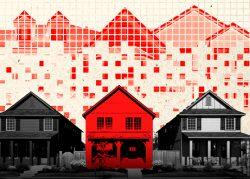Existing-home sales went down for the fourth consecutive month, slumping by 3.4 percent in May from the previous month, the National Association of Realtors reported Tuesday.
The tide isn’t turning anytime soon, with low inventory, high mortgage rates and higher prices limiting deals and sidelining some would-be buyers.
“Further sales declines should be expected in the upcoming months given housing affordability challenges from the sharp rise in mortgage rates this year,” said NAR chief economist Lawrence Yun in a statement.
The interest rate for 30-year, fixed-rate mortgages jumped to 5.23 percent in May, up from 4.98 percent in April, according to Freddie Mac. On Tuesday the average rate was 6 percent.
However, as sales slowed, housing prices continued to soar in May. The median price for existing homes rose 14.8 percent in May from a year earlier to a record $407,600. That’s no surprise: The median price has consistently hit record highs each month from the year before for nearly 10 years.
Read more


Yun suggested that the inventory levels needed to nearly double for the appreciation of home prices to slow down.
Across the country, there were 1.16 million units for sale or under contract at the end of May, up 12.6 percent from April and down 4.1 percent from May 2021, according to the NAR.
The pace of price appreciation ticked up everywhere in the U.S., with the largest increase in the South (for the ninth consecutive month), followed by the West, then the Midwest and Northeast.
Homes that sold were not on the market for long, as has been the case for a while. Properties that went into contract last month typically were on the market for 16 days, down from 17 days in April and 17 days in May 2021. Only 12 percent of homes sold in May were on the market for more than a month.
Demand for houses has exceeded supply since the start of the pandemic. Some Americans accelerated buying plans or sought to take advantage of remote work and low interest rates, while would-be sellers were able to change jobs without moving or refinanced before rates rose. But with remote work becoming the new normal, housing inventory could continue to get squeezed.
